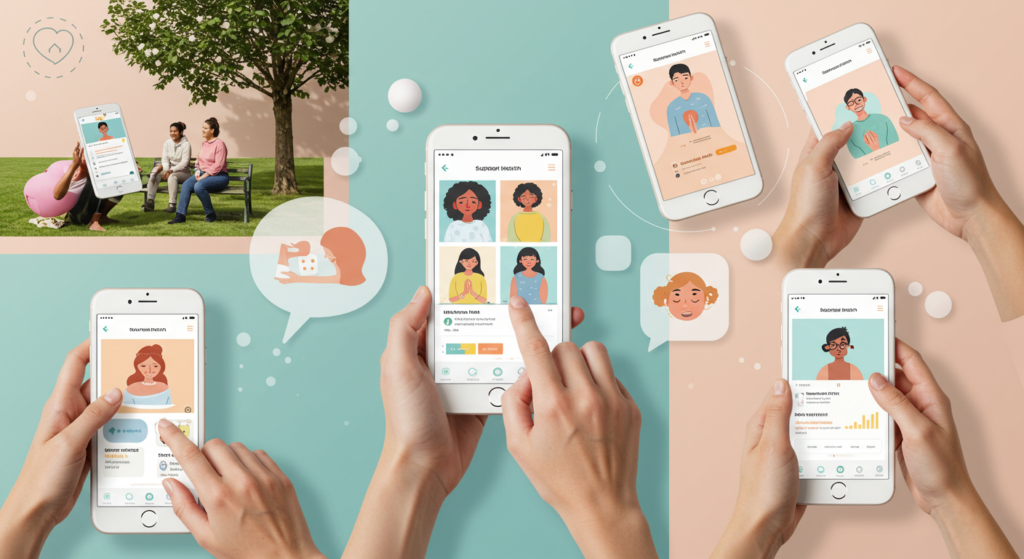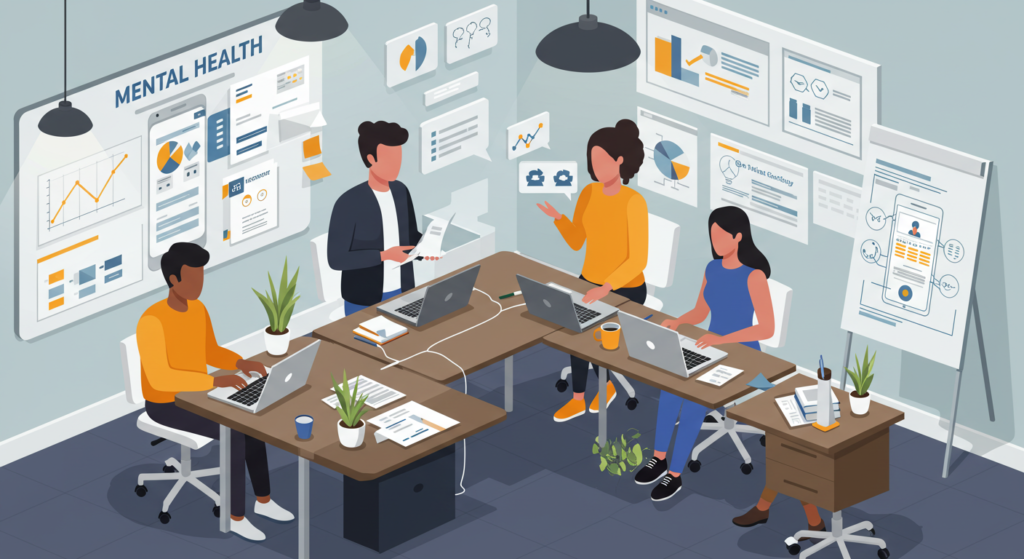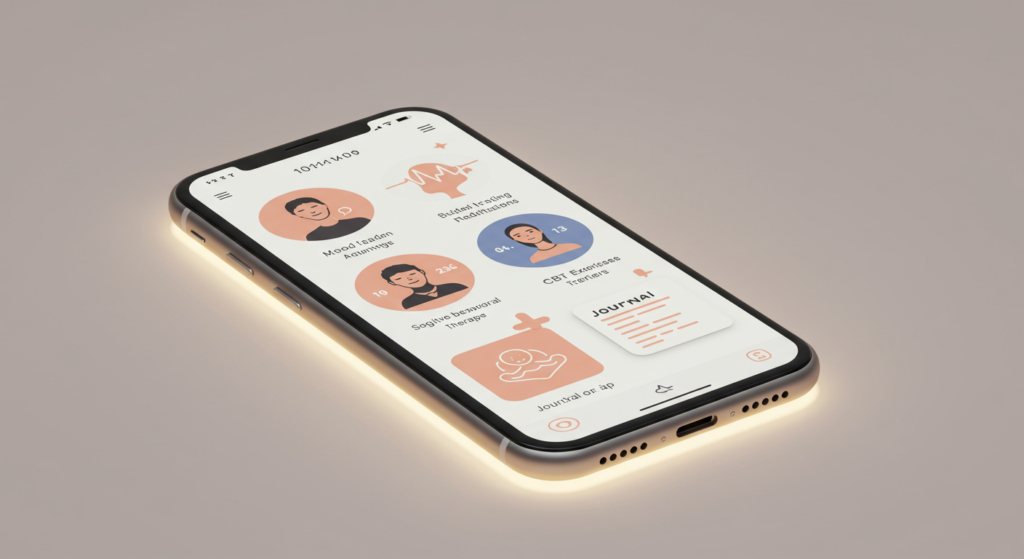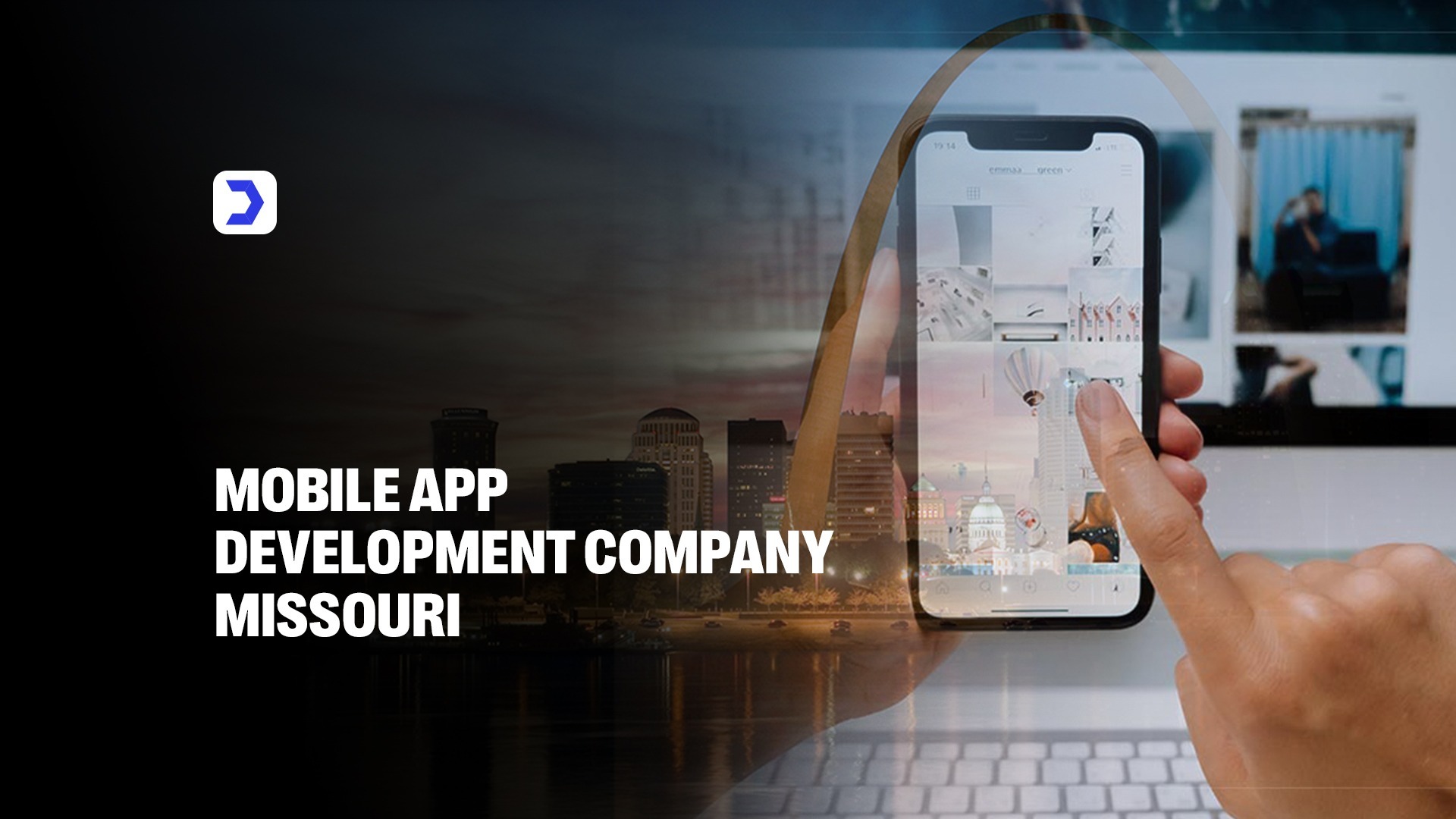As the world moves at an ever-increasing pace, the importance of mental health has never been more apparent. Rising stress levels, anxiety, and mental health disorders have led individuals to seek out more accessible and flexible solutions for support. Mental health apps have emerged as a powerful tool, offering timely guidance and therapeutic services without the need for face-to-face sessions.
The success of these apps is largely attributed to mobile app development solutions, which play a critical role in ensuring smooth functionality, secure data handling, and a seamless user experience. With sophisticated backend systems and advanced security protocols, these solutions ensure that sensitive user data is protected, enhancing trust and reliability. Furthermore, the right development approach allows mental health apps to scale effectively, reaching a broader audience and providing users with affordable, accessible care. In this blog, we’ll explore the evolving landscape of mental health app development, examining its benefits, various types, key features, and why it represents a unique opportunity for startups to lead in this impactful field.
Understanding Mental Health App Development
Mental health app development involves creating mobile or web-based applications designed to help users manage their mental health. These apps can offer a wide range of services, from meditation guides to therapy sessions, helping individuals to cope with various challenges like stress, anxiety, and depression. With advancements in technology and the increasing demand for convenient mental health solutions, the development of these apps has become a crucial tool in the healthcare sector.
When looking into mental health app development services, it’s essential to consider features such as ease of use, security, and the ability to integrate mental health experts’ guidance. Developing a mental health app requires careful planning, understanding the users’ needs, and ensuring that the app complies with health regulations and privacy standards.
Understanding the scope of mental health app development goes beyond coding a functional interface; it requires strategic planning, regulatory compliance, and user-focused design. An advanced enterprise development solution plays an important role, enabling secure data handling, real-time therapist connectivity, and seamless integration with healthcare protocols.
Mental Health App Benefits

A mental health app offers various benefits, as it incorporates backend development solutions that enable seamless functionality. These solutions ensure secure data management, real-time communication, and efficient scheduling. By providing a scalable platform, the app helps businesses streamline services while offering users affordable and convenient access to therapy, overcoming traditional barriers like cost and location.
Here’s a breakdown of why they have become so popular:
Immediate Access
One of the primary advantages of a mental health app is that users can access mental therapy whenever they need it. Instead of waiting for an appointment, individuals can use the app to find immediate assistance, whether it’s guided meditation, anxiety-reducing exercises, or one-on-one therapy sessions.
Easy to Use
Most apps for mental health are designed with simplicity in mind. They feature intuitive user interfaces, making it easy for individuals, even those with little technical expertise, to navigate the app and find the services they need.
Effective
With the right combination of features, such as personalized therapy programs, mood tracking, and expert advice, these apps can be highly effective in helping users manage their mental health. Many people find that mental therapy apps offer a level of convenience and accessibility that traditional therapy often lacks.
Not as Expensive as Conventional Sessions
Mental health therapy can be costly, especially without insurance. Developing a mental health app offers a convenient, affordable solution, providing access to therapy at a fraction of traditional costs. The expense of developing an app in 2025 is a one-time investment with long-term benefits, benefiting businesses, psychologists, and psychiatrists by offering scalable services, while ensuring patients enjoy flexible, accessible care.
Secure
When building a mental health app, the reliability of backend development solutions ensures that patient data remains protected throughout the app’s usage. By creating secure frameworks for data encryption, access control, and storage, these solutions lay the groundwork for a trustworthy platform, making it easier for users to engage with mental health services securely and privately.
Automate Work Processes
For mental health professionals, apps can help automate work processes. This can include scheduling sessions, tracking patient progress, and sending reminders for self-care activities. Automation can significantly reduce the workload for therapists while enhancing the experience for users.
Monitoring by Patients
With mental health apps, users can track their mental health journey over time. Features like mood tracking, journaling, and progress reports can help users monitor their mental state and provide valuable insights into their mental well-being.
Why is it a Good Idea for a Startup to Develop a Mental Health App?

Developing a mental health app is a great opportunity for startups due to the rising demand for accessible solutions. With the integration of backend and frontend development, these apps can handle large data securely while offering an easy-to-use interface. This scalability allows for global expansion, making it a cost-effective alternative to physical clinics. Mental health apps can address a wide range of concerns, making them a smart investment for startups looking to make a meaningful impact.
Empower well being with Mental Health App Development for support, growth, and emotional balance.
Enhance emotional tracking, boost user engagement, and streamline care delivery with Mental Health App solutions tailored for modern wellness.
Types of Mental Health Apps
There are various types of mental health apps designed to meet different needs. Let’s look at some common ones:
Mental Disorders Apps
These apps focus on helping users manage and cope with mental disorders like depression, anxiety, and schizophrenia. Features might include therapy guides, coping strategies, and support groups.
Eating Disorders Apps
Designed for individuals struggling with eating disorders, these apps provide features like meal tracking, emotional support, and therapy sessions tailored to those in recovery.
Managing Anxiety and Depression Apps
Specialized apps offer tools and resources to help users with anxiety and depression, such as relaxation exercises, mood tracking, and self-help activities.
Addiction Helpers Apps
For individuals battling addiction, these apps provide support networks, coping strategies, and access to therapy to help manage the addiction recovery process.
Self-Improvement Apps
These apps help individuals improve their overall well-being by focusing on personal growth, mindfulness, and self-care routines.
Apps for Meditation and Mindfulness
Mindfulness and meditation apps offer guided sessions to help users reduce stress and anxiety, improve focus, and cultivate a positive mindset.
Features for a Mental Health App

When developing a mental health app, certain features are crucial to ensure it provides value to users. Here are some essential features:
Sign Up/Sign In
A secure sign-up and sign-in process are vital to protect users’ personal information and ensure that they can access their sessions and data.
Therapist Profile
Including detailed therapist profiles allows users to choose the mental health professional best suited to their needs, enhancing their overall experience.
Dashboard
A dashboard provides a comprehensive overview of the user’s progress, including session history, mood tracking, and upcoming appointments.
Notifications
Notifications can remind users about upcoming sessions, self-care activities, or important updates, ensuring they stay on top of their mental health journey.
Audio and Video Calls
For those seeking therapy through the app, the ability to have audio or video calls with professionals is an essential feature for a seamless experience.
Conclusion
The demand for mental health services continues to grow, and developing a mental health app presents a powerful way to address this need. With benefits like immediate access, ease of use, and effectiveness, these apps are revolutionizing mental health care. Startups looking to develop a mental therapy app have the opportunity to tap into a broad market and provide essential services to individuals worldwide. Digital Software Labs enables businesses to leverage this growing demand by developing secure, scalable, and user-friendly mental health apps. Our expertise helps businesses create innovative solutions that provide accessible mental health support while ensuring smooth functionality and user privacy. All these aspects are discussed in our blog section, where we delve into the trends and opportunities shaping the mental health app development industry.
FAQs:
A mental health app is a mobile or web-based application designed to help individuals manage their mental well-being by providing therapy, mindfulness exercises, mood tracking, and other mental health services.
The development of a mental health app typically takes several months, depending on the complexity of features, design, and testing. It can range from 4 to 12 months.
The cost of developing a mental health app depends on various factors, including the complexity of features, the platform, and the development team’s location. Features like video calls, mood tracking, personalized therapy, and security measures all affect the pricing. Evaluating the app’s specific needs will help determine the investment required.




